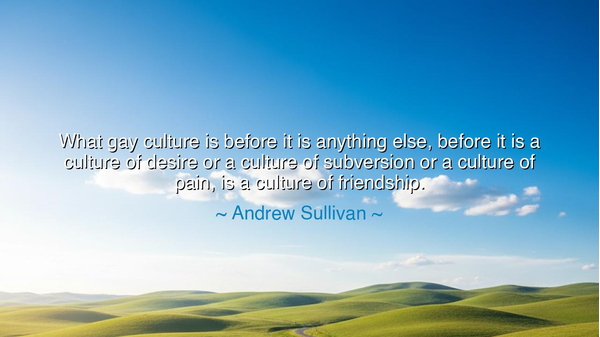
What gay culture is before it is anything else, before it is a
What gay culture is before it is anything else, before it is a culture of desire or a culture of subversion or a culture of pain, is a culture of friendship.






In the tapestry of human connection, there are certain bonds that form the foundation of any community, regardless of its form or expression. Andrew Sullivan, with profound insight, reflects on the essence of gay culture when he states: "What gay culture is before it is anything else, before it is a culture of desire or a culture of subversion or a culture of pain, is a culture of friendship." These words resonate with a truth that transcends time and place: at the heart of every community, at the foundation of every shared struggle and victory, lies the unbreakable bond of friendship. Sullivan speaks to the deep, often overlooked, power of friendship that is the silent force behind cultural movements, shaping and nurturing the souls of those who come together in support of one another.
The ancients knew well that the strongest and most enduring communities were those built on the foundation of friendship. Consider the relationship between David and Jonathan in the Hebrew Scriptures, whose bond was not born from shared bloodlines or political power, but from a profound mutual respect and loyalty that transcended the norms of their society. David and Jonathan stood side by side, supporting each other through the storms of their lives. Their friendship was not simply a social contract; it was a covenant, a pact that held them together even in the most difficult of circumstances. In this, we see that friendship is not only an emotional connection but a force of great strength, one that unites people in ways that nothing else can.
This culture of friendship that Sullivan speaks of is not merely about casual camaraderie, but about the deep, enduring relationships that arise in the face of adversity. Gay culture, throughout history, has often been shaped by marginalization, persecution, and pain, but it has also been defined by a profound commitment to solidarity and support. In the face of rejection and hate, the gay community found strength not in isolation but in the bonds of friendship that sustained them. Friendship, in this context, became not just a refuge but a form of resistance—a quiet rebellion against the forces that sought to tear people apart.
Consider, for instance, the bond between Socrates and his disciples in ancient Athens. Socrates, though a man of great intellect and unconventional ideas, found his greatest strength not in his solitary musings but in the companionship of his friends. They supported one another in their pursuit of truth, often at great personal cost, and their friendship became the bedrock of the philosophical movement that would shape Western thought. Sullivan’s words echo this truth: before a culture is defined by its desires or its struggles, it is first and foremost built upon the foundations of friendship—a collective bond that elevates each individual and gives strength to the whole.
The lesson in Sullivan’s reflection is not just about the importance of friendship within gay culture but about the universal truth that every community, every movement, and every individual is shaped by the relationships they cultivate. In our own lives, the friendships we nurture are often the unseen forces that shape our destinies. It is through these bonds that we find the courage to face our fears, the strength to endure our pain, and the resolve to stand firm in the face of adversity. Sullivan reminds us that no matter the external forces or the challenges that we face, friendship is the bedrock upon which everything else is built. It is the force that drives us forward when all else seems uncertain.
Just as David and Jonathan formed a bond that transcended all external circumstances, so too must we cultivate relationships that are not defined by fleeting circumstances or superficial differences. True friendship is built on understanding, respect, and a shared commitment to one another’s well-being. Sullivan’s reflection invites us to understand that the culture of any group, particularly one that has experienced oppression or marginalization, is forged in the heart of friendship—the relationships that give meaning to life and form the foundation for future generations to thrive.
In our own lives, we must seek to build and protect these kinds of friendships—relationships that are grounded in support, loyalty, and mutual respect. Let us not fall prey to the illusion that friendship is merely a side note in our lives. Sullivan’s words remind us that friendship is the very fabric of our humanity, and it is through these bonds that we discover our greatest strengths. In a world that often demands division and individualism, we must be the ones to nurture and uphold the culture of friendship that connects us to one another, that reminds us of the shared humanity we hold in common, and that gives us the courage to face the trials ahead.
Thus, let us heed the wisdom of Sullivan and the ancients: that friendship is not simply a nice addition to our lives, but the very foundation upon which everything else is built. It is the core of every community, every movement, and every soul. In building friendships rooted in understanding and respect, we forge a bond that can withstand the trials of time and transform not just our individual lives but the world around us. Let us embrace the culture of friendship in all its forms, for in it lies our greatest strength.






AAdministratorAdministrator
Welcome, honored guests. Please leave a comment, we will respond soon